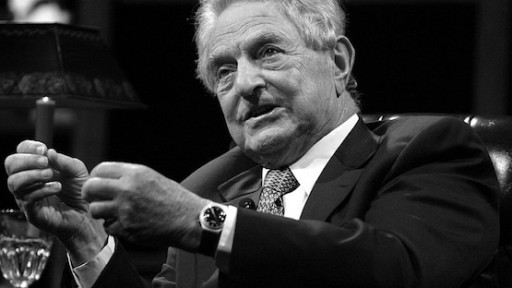- Home
- >
- Great Traders
- >
- Soros: Philosophy of an Elite and Powerful Investor

Soros: Philosophy of an Elite and Powerful Investor

George Soros spent decades at the head of the class among the world's elite investors. А $1000 investment with him back in 1969 would have been worth more than $4 million today. The man, who "broke the bank of England", was named "The World's Greatest Money Manager" in 1981.
Philosophy of an Elite Investor.
Soros is a short-term speculator. He makes massive and highly-leveraged bets on the direction of the financial markets. His famous hedge fund is known for its global macro strategy , a philosophy centered around making massive, one-way bets on the movements of currency rates, commodity prices, stocks, bonds, derivatives and other assets based on macroeconomic analysis.
Soros studies his targets, letting the movements of the various financial markets and their participants dictate his trades. He refers to the philosophy behind his trading strategy as reflexivity. The theory avoids traditional ideas of an equilibrium-based market environment where all information is known to all market participants and thereby factored into prices. Instead, Soros believes that market participants themselves directly influence market fundamentals, and that their irrational behavior leads to booms and busts that present investment opportunities.
George Soros will always be remembered as "the man who broke the Bank of England." A well-known currency speculator, Soros does not limit his efforts to a particular geographic area, he considers the entire world when seeking opportunities. In September of 1992, he borrowed billions of dollars worth of British pounds and converted them to German marks. When the pound crashed, Soros repaid his lenders based on the new, lower value of the pound, pocketing in excess of $1 billion in the difference between the value of the pound and the value of the mark during a single day's trading. He made nearly $2 billion in total after unwinding his position.
Governments lived in fear that Soros would take an interest in their currencies. When he did, other speculators joined what's been described as a pack of wolves descending on a herd of elk. The massive amounts of money the speculators could borrow and leverage made it impossible for the governments to withstand the assault.
Despite his masterful successes, not every bet George Soros made worked in his favor. In 1987, he predicted that the U.S. markets would continue to rise. His fund lost $300 million during the crash, although it still delivered low double-digit returns for the year.
He also took a $2 billion hit during the Russian debt crisis in 1998 and lost $700 million in 1999 during the t ech bubble when he bet on a decline. Stung by the loss, he bought big in anticipation of a rise. He lost nearly $3 billion when the market finally crashed.
Trading like George Soros is not for the light of wallet. The major bad side of betting big and winning big is betting big and losing big. If you can't afford to take the loss, you can't afford to bet like Soros. While most global macro hedge fund traders are relatively quiet types, avoiding the spotlight while they earn their fortunes, Soros has taken very public stances on a host of economic and political issues.
 Varchev Traders
Varchev Traders If you think, we can improve that section,
please comment. Your oppinion is imortant for us.






